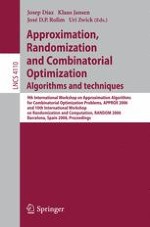2006 | OriginalPaper | Buchkapitel
Robust Mixing
verfasst von : Murali K. Ganapathy
Erschienen in: Approximation, Randomization, and Combinatorial Optimization. Algorithms and Techniques
Verlag: Springer Berlin Heidelberg
Aktivieren Sie unsere intelligente Suche, um passende Fachinhalte oder Patente zu finden.
Wählen Sie Textabschnitte aus um mit Künstlicher Intelligenz passenden Patente zu finden. powered by
Markieren Sie Textabschnitte, um KI-gestützt weitere passende Inhalte zu finden. powered by
In this paper, we develop a new “robust mixing” framework for reasoning about adversarially modified Markov Chains (AMMC). Let ℙ be the transition matrix of an irreducible Markov Chain with stationary distribution
π
. An adversary announces a sequence of stochastic matrices
$\{{\mathbb{A}}_t\}_{t > 0}$
satisfying
$\pi{\mathbb{A}}_t = \pi$
. An AMMC process involves an application of ℙ followed by
${\mathbb{A}}_t$
at time
t
. The robust mixing time of an irreducible Markov Chain ℙ is the supremum over all adversarial strategies of the mixing time of the corresponding AMMC process. Applications include estimating the mixing times for certain non-Markovian processes and for reversible liftings of Markov Chains.
Non-Markovian card shuffling processes:
The random-to-cyclic transposition process is a
non-Markovian
card shuffling process, which at time
t
, exchanges the card at position
$t {\pmod n}$
with a random card. Mossel, Peres and Sinclair (2004) showed that the mixing time of this process lies between (0.0345+
o
(1))
n
log
n
and
Cn
log
n
+
O
(
n
) (with
C
≈4 ×10
5
). We reduce the constant
C
to 1 by showing that the random-to-top transposition chain (
a Markov Chain
) has robust mixing time ≤
n
log
n
+
O
(
n
) when the adversarial strategies are limited to those which preserve the symmetry of the underlying Markov Chain.
Reversible liftings:
Chen, Lovász and Pak showed that for a reversible ergodic Markov Chain ℙ, any reversible lifting ℚ of ℙ must satisfy
${\mathcal{T}}({\mathbb{P}}) \leq {\mathcal{T}}(\mathbb{Q})\log (1/\pi_*)$
where
π
*
is the minimum stationary probability. Looking at a specific adversarial strategy allows us to show that
${\mathcal{T}}(\mathbb{Q}) \geq r({\mathbb{P}})$
where
r
(ℙ) is the relaxation time of ℙ. This helps identify cases where reversible liftings cannot improve the mixing time by more than a constant factor.
